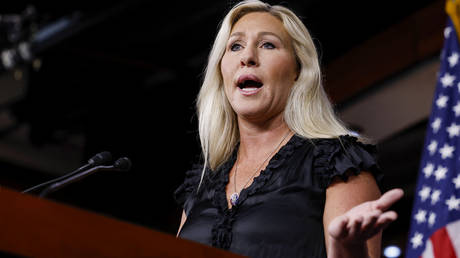
The group can bypass the dollar, chipping away at Washington’s economic dominance, Marjorie Taylor Greene has said
As BRICS gains momentum, the US economy becomes weaker because the members of the grouping can circumvent American sanctions and trade in their own currencies, Republican Representative Marjorie Taylor Greene said on Thursday.
Speaking to her constituents in Georgia, the Republican congresswoman lashed out at the administration of US President Joe Biden, which she said is turning a blind eye to the rise of BRICS – an economic group which consists of Brazil, Russia, India, China, and South Africa and accounts for more than a quarter of global GDP.
The Republican firebrand claimed that while the Washington is “doing… nonsense” – including providing all kinds of support to Ukraine which is locked in a conflict with Russia – “there are other countries in the world, powerful countries, organizing together because they are tired of the United States.”
In this sense, the BRICS countries are making serious trade agreements “where they are saying: we’ll buy from you, you’ll buy from us, we don’t care about US sanctions and we’ll sell to one another, buy and sell in our own currency, not the US dollar,” she stated.
“This is one of the most devastating things that can happen to all of us,” Greene claimed.
As BRICS becomes more powerful, the US dollar gets weaker, she said. “And you know what happens to all of us? We’re going to go broke,” the congresswoman predicted, adding that this dynamic will negatively affect the retirement plans and personal savings of ordinary Americans.
“What is going to happen to our children, when the US dollar means nothing anymore, because Russia, and China, and India with its huge population of billions of people have more buying power in their own currencies than we do? This is a very serious concern,” Greene said.
The congresswoman’s remarks come on the heels of a historic BRICS summit in South Africa, where the group agreed to an unprecedented expansion, admitting six new countries – Argentina, Egypt, Ethiopia, Iran, Saudi Arabia, and the United Arab Emirates – which will become full-fledged members in 2024.
In a declaration summarizing the summit, BRICS, which has historically positioned itself as an alternative to Western-dominated international institutions, reaffirmed its commitment to inclusiveness, while expressing support for the “legitimate aspirations” of African, Asian, and Latin American countries to play a more prominent role in the global arena.




